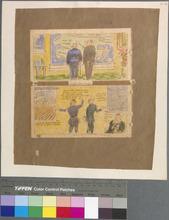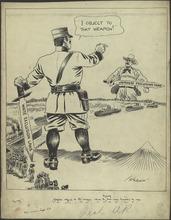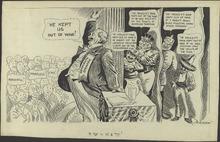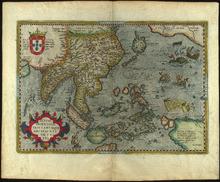16 - 19 of 19 records
JM-W024: In the Allied camp

Description:
Editorial cartoon depicting Churchill and FDR looking at a map of Europe in the top panel. In the bottom panel, Hitler, Togo, and Mussolini worry about the plane production in the U.S. as the "unpredictable" factor compared to their U-boats.
Member of:
McCutcheon Editorial Cartoons - ALL (Collection)
Resource Type:
Still Image
JM-148: Japan objects to the weapon which he himself has never hesitated to use

Description:
This cartoon personifies United States relations with Japan in 1913. Japan is criticizing California for employing Japanese exclusion laws. These laws are most likely a reference to the California Alien Land Law of 1913. This law prohibited "aliens ineligible for citizenship" from owning agricultural land or possessing long-term leases, but permitted short-term leases lasting up to three years. This act was problematic for diplomatic relations with Japan, as it directly discriminated against Japanese citizens. This law also limited the number of Japanese immigrants to come to the US. While this law actually had little tangible backlash on Japanese citizens, it caused a large amount of tension between Japan and the US. Japan is also illustrated wielding the weapon of exclusion laws. In response to California's discrimination laws, Japan threatened to begin creating policies, which would discriminate against Americans. (Summary created by Mary Delano, MU History Intern, Spring 2018)
Member of:
McCutcheon Editorial Cartoons - ALL (Collection)
Resource Type:
Still Image
JM-169: He kept us out of war!

Description:
This cartoon shows a democratic speaker addressing a crowd. The speaker is saying, "He kept us out of war", which was President Wilson's campaign slogan for the election of 1916 against Charles Hughes. There are various countries making comments behind the speaker. This first man on the left represents Japan. Japan is saying President Wilson would have gone to war with Japan, if he had allowed an act discriminating against Japanese immigrants in larger immigration legislation.The country next to Japan is England. England is saying that President Wilson would have entered World War I, if he had protected American shipping. This is a reference to the attack of an American ship, the Lusitania, by a German submarine. Japan and England were both Allied powers during World War I, and they are separated from the Axis powers, Germany and Mexico, by a wall. Germany is saying that President Wilson would not have needed to keep the United States out of war, if Germany had not been an aggressor against other nations. Next to Germany, Mexico is saying President Wilson would have declared war, if he had remained adamant on the salute if the flag. This refers to when President Wilson did not want to salute (and thus recognize) the Mexican government under the control of Victoriano Huerta. Despite his apprehension, President Wilson eventually returned the salute from a sense of precedent and duty. (Summary created by Mary Delano, MU History Intern, Spring 2018)
Member of:
McCutcheon Editorial Cartoons - ALL (Collection)
Resource Type:
Still Image
Indiae Orientalis, insularumque adiacientium typus

Description:
Scan specification: Indus Color Book Scanner 5005 ; 600 dpi ; color ; TIFF ; lzw compressionnScan date: February 2019.nOriginal held in University Libraries Special Collections.nDate taken from WorldCat record.
Member of:
Venable Maps
Resource Type:
cartographic
Pagination
- Previous page
- Page 2